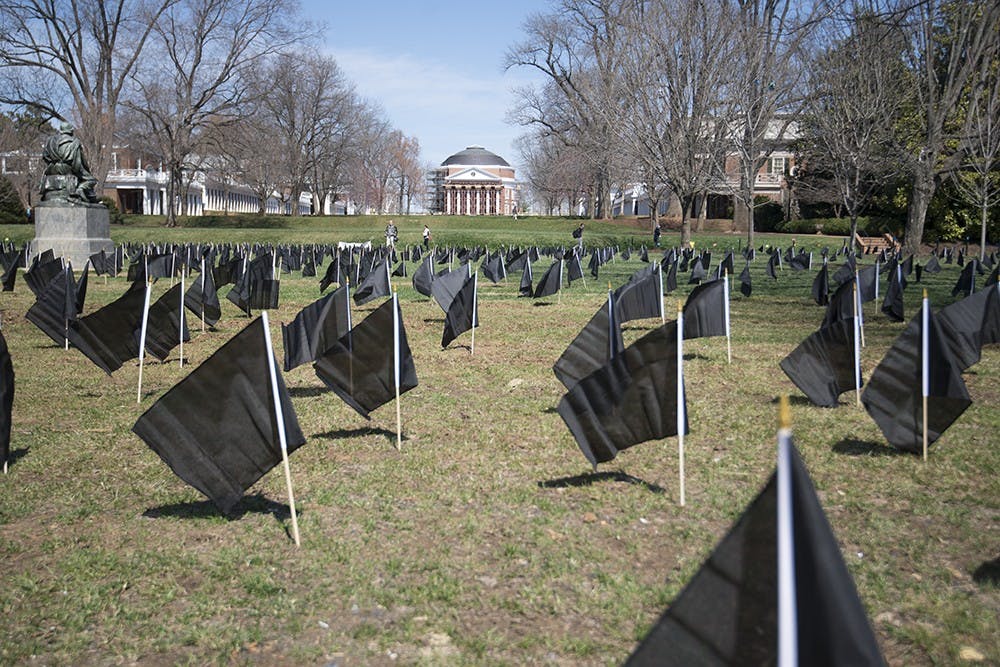The University’s chapter of To Write Love on Her Arms placed 1,100 black flags on the South Lawn Monday to represent the 1,100 college students who die by suicide every year.
TWLOHA is a nonprofit organization that aims to fight the stigma surrounding mental health, create a “better and safer” conversation about mental health and educate and inform people about the importance of receiving treatment.
With the help of the Z Society, TWLOHA placed the black flags to both respect student lives lost to suicide and raise awareness. TWLOHA Vice President Arianna Trickey, a Curry graduate student, said the campaign is a way to bring attention to the conversation surrounding mental health.
“The Black Flag Advocacy Campaign is a way to break the stigma,” Trickey said. “Suicide is not something that anyone wants to talk about, even though the ripple effect of a suicide affects everyone.”
The Black Flag Campaign’s goal is to encourage students struggling with their mental health to seek the medical attention they need.
“It’s not meant to be a bandwagon,” Trickey said. “It’s part visibility, but we’ve also made sure that resources are available. We want to stress that suicide is not the answer — there are other avenues to get help here at the University.”
Trickey also explained the purpose of the University chapter of the organization.
“As an organization we try to do a lot of advocacy work to end the stigma and discuss what being a college student in a culture that stigmatizes mental health is,” Trickey said. “We’re trying to show that U.Va. is not alone in this problem and that there are so many people who have faced these issues.”
The primary goal of TWLOHA is to educate and advocate for people struggling with mental health — 10 percent of students experience depression, and an estimated two-thirds of those students are untreated, Trickey said. TWLOHA aims to connect people to the resources they need to combat mental health problems, she said.
“One of the things we have to stress is that we are not a support group,” Trickey said. “We are a group of individuals dedicated to helping students at the University getting the help that they need … at the beginning of the semester, we created a document of every resource that we could possibly think of that a student could use, covering depression to eating disorders to anxiety to sexual assault.”
Last semester, TWLOHA hosted National Suicide Prevention Week on Grounds, and the Z Society commended the chapter’s hard work by sending the organization a letter.
“We had to dig through the stacks to find it, and the letter was discussing that [the Z Society] really appreciated the efforts we had made to bring hope to the students at the University,” Trickey said. “They offered us resources to continue this.”
Third-year College student Shannon Power, a member of TWLOHA, said she believes the Black Flag Campaign, like many others, is primarily motivated by advocacy.
“It's flashy, it's on the Lawn, and it draws attention to the problem,” Power said. “What needs to happen now that the problem of suicide has been brought to the front of people's minds is engagement, either through discussion with the administration, or among schools to create a larger support network, or through involvement of the national TWLOHA organization. Now that people are talking, we need a next step to motivate action and change.”
Power said she has seen it become more acceptable this year for students to seek help through CAPS, but said she thinks students are becoming more aware of people around them who might be considering suicide.
“Besides the resources provided by the school, students are taking it upon themselves to listen to others' stories and help them talk through whatever is causing them to consider suicide,” Power said. “That's one of the ways that TWLOHA is different from anything that President Sullivan or the administration could implement for the student body — when help comes from people who are like you, who are maybe experiencing some of the same challenges and stresses that you are, it's easier to trust that person to understand.”
Looking to the future, Power said she would like to see the expansion of student peer networks on Grounds and across the country.
“A great next step would be to create connections between peer networks at schools that are similar to ours that have students who are under the same kinds of stress and expectations as we are, so students can see that they are by no means alone,” Power said. “Through these networks, and by creating a large group of peers who can speak without fear of being judged or worse, pitied, I think we can start to make people see how much they are needed and loved.”







